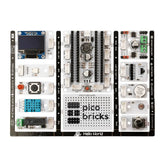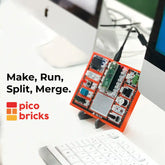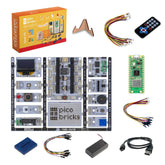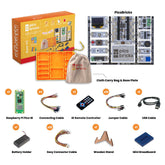Best Arduino Leonardo Based Development Board: TINYLAB!
Those who engage in Arduino projects are well aware: The easiest way to connect equipment for a project to Arduino is by using shields! However, don't we get frustrated when the pins of the shields we stack on top of each other don't work, or when indicators, buttons, sensors, or connections on the lower shield become unusable?
We’re aware that you wanna solve this problem... That's why we developed Tinylab, which offers a single board solution for Arduino with the most commonly used sensors, wireless communication modules, DC motor drivers, and many more components. We want you to focus more easily on your ideas instead of dealing with connection issues while developing your projects!
In this article, we'll delve into Arduino Leonardo in detail! We'll discuss which Arduino is better for your basic Arduino projects, mBlock 5.0, and Tinylab!
Ready to get started?
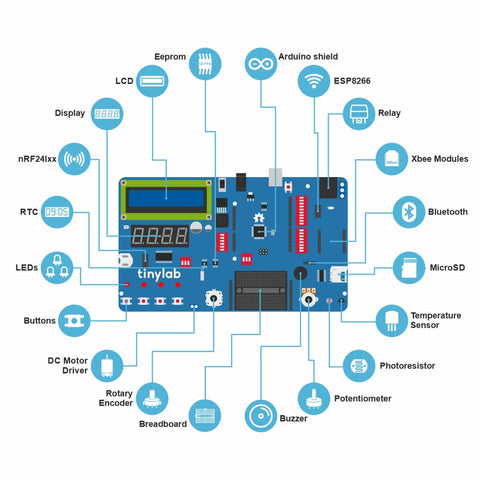
For Basic Arduino Projects, Which Arduino Is The Best? Can It Be Arduino Leonardo?
Yes! Arduino Leonardo is a suitable option for basic Arduino projects. Leonardo comes with many standard Arduino features and is also compatible with various sensors, motors, and other components. Moreover, the built-in USB connectivity feature of Leonardo allows you to easily connect and program your projects to your computer. However, the most suitable model may vary depending on the requirements of the project.
What Is Arduino Leonardo?
Arduino Leonardo is like a wizard among microcontroller boards! Unlike other Arduino models, Leonardo can communicate directly with a computer via USB and can even act as a computer mouse or keyboard. It's incredible to think that an Arduino can be so versatile, isn't it? Leonardo allows you to push your limits and unleash your creativity in your projects. It's not just a board, it's a friend and your greatest companion in your adventure!
Projects you can create:
- Robot Applications: Arduino Leonardo can control robotic arms, off-road vehicles, drones, and other robotic projects.
- Game Control Devices: Arduino Leonardo allows you to design your own game consoles or game control devices.
- Data Collection and Monitoring Systems: Integrated with sensors and other devices, Arduino Leonardo can create data collection and monitoring systems.
- Education and Teaching Projects: Arduino Leonardo can be used as interactive teaching tools and experiment kits for STEM education.
There are indeed many projects you can create with this board. However, we have a favorite, Tinylab... Tinylab is a development board we've designed to eliminate the prototypical problems you encounter in your Arduino projects. Don't get us wrong, we're not saying this just because we made it, but Tinylab is an excellent educational platform. It's a development board we've designed to eliminate the prototyping issues you encounter in your Arduino projects.
Moreover, it's also highly ideal for advanced users. It supports many popular programming platforms. At its core lies an Arduino Leonardo, completely open source. You can access the design files and software on its GitHub page. Sample codes are categorized by difficulty levels, allowing you to explore projects at different skill levels step by step.
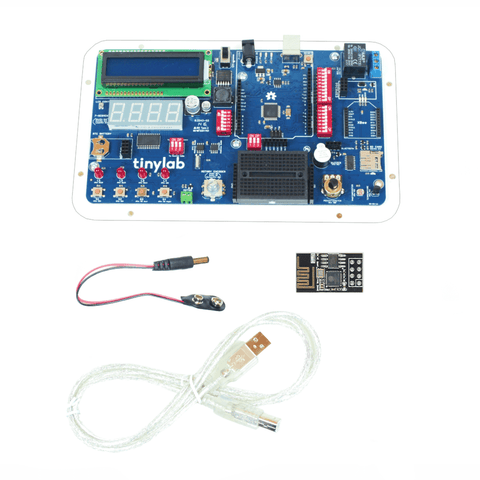
Tinylab, being the size of a tablet computer, can be easily carried in your bag!
Tinylab Supports Programming with mBlock 5.0!
TinyLab isn't your average development board. It's your ticket to an exciting world of prototyping, packed with all the components you need and powered by Arduino! And here's the kicker: with the latest mBlock 5 update, TinyLab opens the door to Scratch based programming. Scratch is all about drag and drop coding, making it super fun and easy for beginners to learn the ropes. Say goodbye to boring coding interfaces with TinyLab!
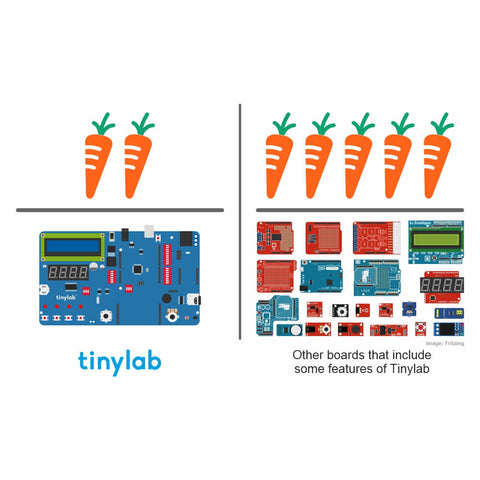
What is mBlock?
mBlock redefines the coding experience by seamlessly combining powerful programming capabilities with easy drag-and-drop functionality, enabling everyone to enhance their coding skills. It offers a fun and interactive platform for both kids and adults, turning learning to code into an enjoyable adventure. With its customizable block based interface, mBlock provides an excellent foundation for understanding complex coding concepts and encourages users to unleash their creativity. You can create games, control robots, and develop IoT (Internet of Things) projects with mBlock.
In short, What is Tinylab?
Tinylab is a development board designed to eliminate the prototyping problems encountered in Arduino projects. Making connections with electronic equipment can easily confuse someone new to Arduino. Additionally, problems such as carrying and storing all modules separately on the board are eliminated!
Moreover, it offers many modules ready for children to learn programming. It is also compatible with programming platforms like Scratch, allowing young learners to grasp algorithm development logic without dealing with complex electronic connections and code lines. It's not only for young learners but also a comprehensive solution that can be used in microcontroller laboratories at high schools and universities.
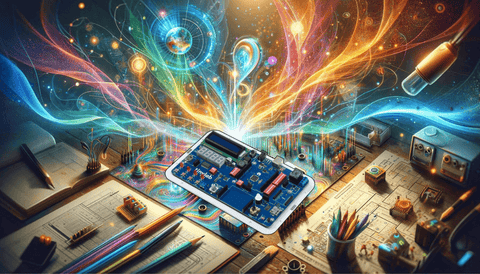
Using all the components on TinyLab, you can create your own project. All the materials, except for the wireless connection modules, come pre-soldered on the board. Also, when you need wireless communication modules, you can easily attach them to the sockets on the board and add wireless communication capability to your project!
FAQ
Is Arduino good for beginners?
Absolutely, Arduino is fantastic for beginners! Its user-friendly interface and simplified programming language make it accessible to newcomers in electronics and coding. The Arduino Integrated Development Environment (IDE) provides an intuitive platform for writing and uploading code, enabling beginners to start experimenting with projects quickly. With a plethora of tutorials, guides, and online resources available, beginners can easily find support and learn at their own pace.
Arduino's versatility allows beginners to start with basic projects like blinking LEDs and gradually progress to more complex ones, fostering a sense of accomplishment and curiosity. Plus, Arduino boards are affordable, making them accessible to those on a budget. Overall, Arduino offers a hands-on, engaging way for beginners to dive into the exciting world of electronics and programming.
Is Leonardo better than Uno?
When researching Arduino for kids especially, have you ever had trouble deciding which one is better? You're absolutely right because both the Arduino Leonardo and Arduino Uno have their merits, but the choice depends on the specific learning goals and preferences of the educator or student.
Here are some considerations:
Versatility: Charging in with the Arduino Leonardo leading the charge! With its built-in USB wizardry and the power to mimic keyboards and mice, the Leonardo opens doors to a world of endless possibilities. It's like giving kids a magic wand to conjure up projects that dance and sing with the touch of a button.
Simplicity: The Arduino Uno steps confidently onto the stage, flaunting its user-friendly design and neatly labeled pins. It's the go-to choice for beginners, offering a smooth introduction to the enchanting realms of electronics and coding.
Compatibility: Both the Leonardo and Uno bask in the warm glow of the Arduino community, offering a treasure trove of resources, tutorials, and support. Whether you're delving into the depths of the Leonardo's USB sorcery or cruising along with the simplicity of the Uno, help is just a click away.
Engagement: Some kids may find the keyboard and mouse emulation feature of the Leonardo particularly engaging, as it allows them to create projects that interact with computers in unique ways. This could spark their interest and motivation to explore further.
So, who emerges victorious in this epic showdown? Well, that depends on the unique blend of learning goals, interests, and preferences swirling within each classroom. Whether you're drawn to the Uno's simplicity or captivated by Leonardo's boundless creativity, one thing's for sure: both boards promise an electrifying journey through the realms of electronics and coding, making learning an adventure worth embarking on.
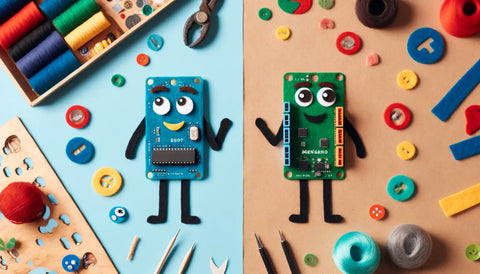
So, whether you're diving into the depths of Arduino Leonardo's sorcery or embarking on an exciting journey with Tinylab, one thing's for sure: the world of electronics and coding has never been more thrilling. So grab your boards, unleash your imagination, and let the adventure begin!
You're invited to visit our blog page for more content like this!
